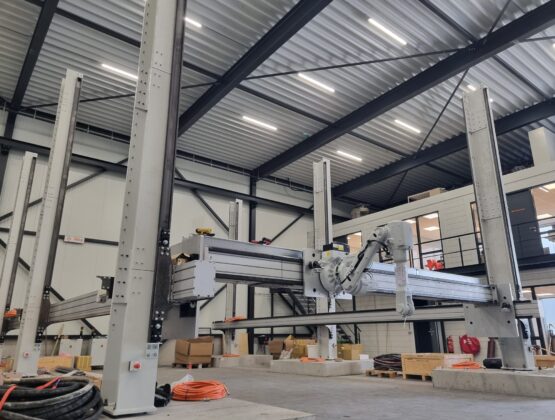Prefabricated Prefinished Volumetric Construction (PPVC) is the housing construction concept which we use to sustainably construct completed, finished units in a factory setting. Those units can later be installed on-site. Learn more about our innovative housing concept PPVC on this page!
What is PPVC?
Prefabricated prefinished volumetric construction is a modular construction method that can be used to construct housing units in a factory setting. These free-standing 3-dimensional modules will be built off-site, in a sustainable manner. We are able to fully complete the units in our off-site fabrication factory, including internal finishes, fixtures, and fittings. This way of modular construction allows us to continuously produce housing modules which are ideal for multi-unit, multi-story buildings. Finished units will be transported to the construction site to be installed on-site. PPVC construction allows for simplification of the on-site assembly in every possible way, as the PPVC modules are optimized for on-site installation from the beginning. The modular construction method allows for continuous, off-site construction of housing units that can be efficiently installed on-site at a later moment.
Render of PPVC Building

Visualization of the PPVC Process

What are the advantages of PPVC?
Prefabricated prefinished volumetric construction is superior to conventional construction in a number of ways. One key advantage of the technique is its contribution to sustainable construction. The modular construction concept allows for the refurbishment and reuse of housing units. Sustainability is further enhanced by our net-zero modules, made possible by our technology and eco-friendly material. Apart from our sustainable construction method, the sustainability of these net-zero housing units can also partly be explained by the controlled construction environment. Off-site PPVC construction in a factory setting will always ensure ideal conditions for construction. This leads to better efficiency, but also improved quality control, better working conditions for laborers, and a higher-quality end product. This improved efficiency will also lead to savings on costs, as well as time. As prefabricated prefinished volumetric construction enjoys optimal productivity, you can save as much as 30% of costs compared to traditional construction. The improved efficiency and logistics, resulting from being able to do every step of the process in one place, allows creating finishing building units within 5 days. The key advantages of PPVC are improvements in sustainability, quality, working conditions, costs, and project timelines.
What are the disadvantages of PPVC?
After learning about the advantages of PPVC and considering its limited global adoption, you might wonder about the disadvantages of PPVC. Questions like ‘What are the challenges of PPVC?’, ‘Is PPVC safe?’, or ‘Why isn’t PPVC more common?’ might arise. The two primary disadvantages of PPVC are the high entry barrier and its complexity. Apart from the technology itself being complex, firm connections can also be a problem. The prefabrication needs to be precise and have low tolerances for the modules to be able to be connected. To make this even more impactful, if something is wrong or delayed, your entire production line can get stuck. This makes the scheduling more difficult too. As transitioning to the technique involves significant costs, and many companies lack the advanced capabilities needed to effectively utilize PPVC, switching to the construction method is not appealing to many construction firms. The transition is often viewed as a risk, as there’s no guarantee that they will be sufficiently sophisticated to efficiently employ prefabricated prefinished volumetric construction. However, for CyBe Construction, these disadvantages of PPVC are irrelevant. Our extensive experience with 3D concrete printing has prepared our technology and company for this advanced modular construction method.
Render of PPVC Modules

The CyBe GR

PPVC by CyBe: Our 3D Concrete Printing Solution
The difficulty of PPVC is no issue for CyBe Construction. With a decade of experience as a 3D concrete printing company, cutting-edge construction technology is nothing new to us. As a company always seeking ways to innovate, we started investing in the R&D of the technique years ago. Our CyBe GR (Gantry Robot) was developed with prefabricated prefinished volumetric construction in mind, and we have created a PPVC construction method for the CyBe GR as a result. The combination of 3D concrete printing technology and prefabricated prefinished volumetric construction leads to the most cost-effective system for constructing multi-unit, multi-story buildings. 3DCP already has the capabilities to construct more sustainably, affordably, and quickly. By merging it with the advanced modular construction method that is PPVC, CyBe Construction pledges to offer the most efficient building method in terms of costs, timelines, and sustainability. With the ability to construct fully finished housing modules within five days, with a cost reduction of 30%, and a CO2 reduction of 32%, CyBe Construction holds the potential to play a crucial role in addressing the global housing crisis.
LyVe Tiny House
The combination of PPVC and 3DCP, with its promise of delivering homes cheaper, faster, and more sustainable, presents a prospective solution for solving the affordable housing crisis on a global scale. However, achieving this level of global impact requires concerted efforts. A crucial step in the journey to address the international housing backlog is the development of diverse housing types. By harnessing PPVC and 3DCP technologies, we have done precisely that by creating the first prototype of the LyVe Tiny House. This net-zero home, consisting of two modules that measure 5.5m x 2.5m each, serves as a pivotal element in providing prefabricated prefinished volumetric construction housing solutions worldwide. This initial prototype, produced in a CyBe Construction Center will be used to scale up our scope of operations to PPVC construction of family homes and even full-sized apartments blocks. Equipped with the knowledge and experience gained from our first PPVC Tiny House module, CyBe Construction is fully prepared to continue our mission of making affordable housing accessible to all.
Render of the LyVe Tiny House
